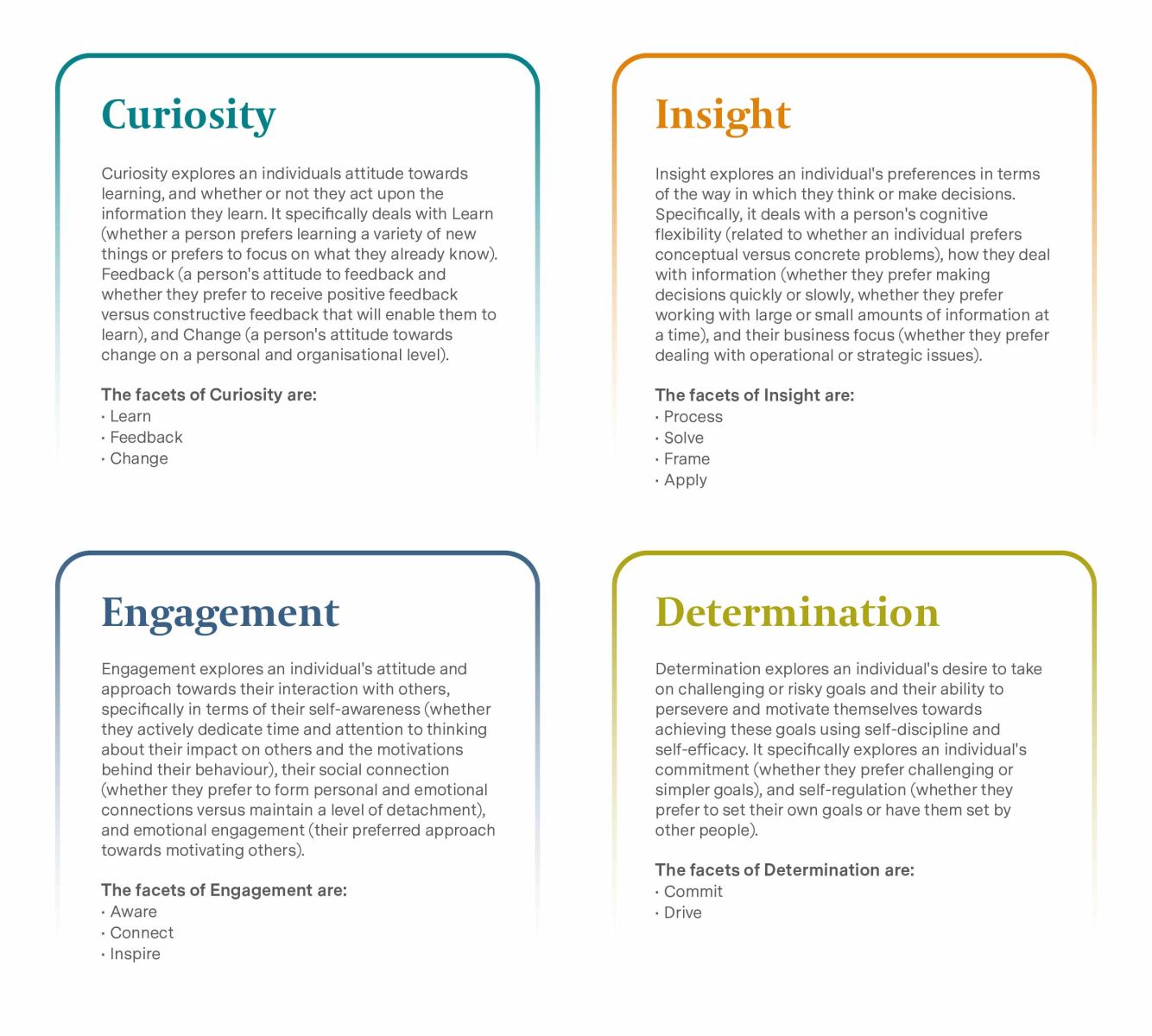As a founder, you are inevitably forging new ground, pioneering and doing things differently. In such an entrepreneurial environment, you can’t always rely on prior experience as a blueprint for selecting new leaders to navigate the challenges of your business. Because if you’re building something new, by definition, no one has the exact experience. Instead, it’s important to assess the intrinsic qualities that enable an individual’s potential to continue to develop and grow.
To help organizations assess their talent beyond the standard competencies, we have leveraged the insights we have built over 60 years studying leaders to understand what the leaders who have developed and grown throughout their careers have in common. Through our research, we have identified four main indicators that form the four pillars of our Executive Leadership Potential model. Recognized in publications such as Harvard Business Review, our model assesses four key attributes – Curiosity, Insight, Engagement and Determination:

These attributes are measured on a scale ranging from Constrained to Extraordinary. Not every strong talent needs to – or should – score Extraordinary on all four traits. What’s important is understanding both where individuals fall on each scale and which traits are necessary for a given role.
Putting Potential into Practice
We have seen this play out in several situations where we worked closely with clients:
With Curiosity, it’s important to note that this encompasses curiosity about oneself, which can indicate how adaptable and coachable someone is. In a recent project with a preeminent global academic institution, we were hiring a leader who didn’t come from academia and who would fundamentally be learning a lot on the job. Having a high curiosity rating was key. It enabled us to see candidates in terms of mental agility and gave us insights about how they might integrate, onboard and assimilate. We needed to consider how quickly they could establish credibility and prove productive.
In an early-stage AI business, the founding CEO was questioning one of his team member’s fit. He respected the team member’s wit and dedication but was exhausted by his intense commitment to “being right.” The CEO sought progress, not perfection – especially since they were still in the early stages with many challenges ahead. When we applied the Potential model to the team, it was evident that the leader in question was extraordinary in Insight. He delved deep into analysis and conceptual frameworks rather than focusing on pragmatic, evident action. With this data, the CEO could understand this colleague’s value while realizing he wasn’t suitable for the current role. We worked together to transition the colleague into an advisory role instead of an operating one, as his deep insights were highly valuable on a quarterly basis but could be distracting on an average afternoon.
In another instance, we were hired by a board of directors to assess the leadership team of a multi-billion-dollar consumer packaged goods organization for a potential CEO successor. The board and the outgoing CEO had a strong hypothesis on who the successor would be but wanted to ensure they assessed the entire leadership team fairly. This organization is a family-run business with a close-knit culture, so it was critical to all involved that their new leader spike high on Engagement. Through our assessment, it was revealed that the originally considered shoo-in candidate scored relatively low on Engagement, meaning they were less energized by connecting with people. This prompted the board to extend the contract of the retiring CEO and launch an external search for a successor.
A CEO was grappling with trust issues with a key deputy but could not articulate exactly why. There were no performance issues and outwardly nothing was objectively wrong. After our Potential assessment, it was noted that the deputy scored lower on Determination than we would typically see in a co-founder (these roles require highly determined individuals). The trust had been eroding as the Founder didn’t understand why his co-founder didn’t seem “all in.” Well, the reality was that he wasn’t. The Determination metric allowed us to identify this and have a conversation that explained – not excused – how his mindset was translating into his actions. When the Founding CEO had this data, he was able to translate an instinct into an understanding which allowed him to reframe his expectations in the relationship. What had been developing as a toxic erosion of trust was repaired.
Ultimately, assessing an individual's combination of these four attributes, in addition to their past performance and competencies, can provide invaluable insights into who is best suited for your evolving team. Without understanding Potential, you risk being stuck in the present and missing out on the future.





